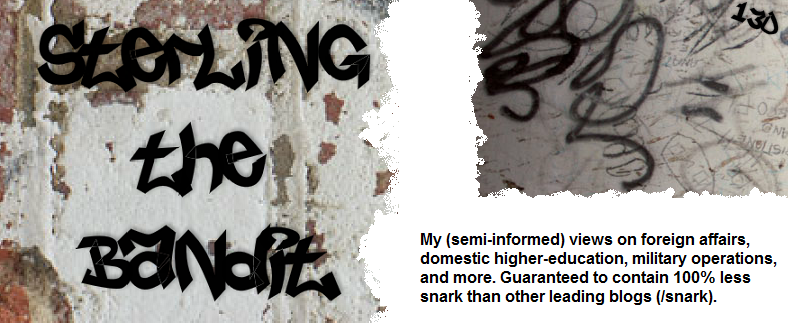 This is primarily directed to the rising number of young conservatives that I've met as of late, but it applies to almost anyone who wants to talk economics, politics, or religion. The post isn't meant to make you run around convincing people your worldview is correct; it's just a few pointers on having a logical conversation.
This is primarily directed to the rising number of young conservatives that I've met as of late, but it applies to almost anyone who wants to talk economics, politics, or religion. The post isn't meant to make you run around convincing people your worldview is correct; it's just a few pointers on having a logical conversation.1. Know Your Facts
I can't stress this enough. You can't seriously discuss any of the above-listed topics unless you know what you're talking about and can provide sources to back up your opinions. You can have any opinion you want; that's your natural right. But you're not going to convince me that the moon landing didn't happen without some really, really compelling evidence.
2. Know What Your Facts Mean
I've seen all sorts of amusing arguments blow up because one party or another didn't realize that the information they were providing was incomplete (or because they hadn't thought out the ramifications of said information). When the opposing party points this out, it tends to lead to a strong anger response from the original speaker. Oh, and it drives economics-minded folks nuts when someone can't understand the difference between "percentage" and a "percentage point". Journalists tend to be really, really bad with this. If you're making a comparison, use statistics that are similar to or from the same source. Pollsters tend to be pretty bad with this one.
3. Know How To Argue
This is one of the biggest problems: we don't teach logic and debate very well, if at all, anymore. Go check Wikipedia for "logical fallacies". You might be surprised to see how often these crop up in various political interchanges. Avoid, at all costs, ad hominem attacks and "straw men" (our current president is rather infamous for using this tactic). These fallacies, once you start spotting them, make the speaker sound like the guy who says, "Well, I can't be racist. One of my best friends is [race/color/religion X]." Irrelevant. Don't go down that road; there be dragons.
4. Know When To Stop
Look, if you don't know, you don't know. I can argue that I believe that farm subsidies for sugar and ethanol, in particular, are generally harmful. I've seen numbers, time and time again, showing that the federal subsidies intended for "Mom and Pop" farmers are actually funneled to the huge conglomerate farming that's commonplace in America. This is an Occam's Razor issue - Mom and Pop don't have huge lobbying efforts persuading lawmakers to pass legislation in their favor. Now, if you ask me for specific numbers on how much of what money goes where, I can't tell you. I'd have to do a significant amount of digging to find out. Until I can give an intelligent reply, I'll bow out of that particular argument.
5. Keep An Open Mind
Sorry that this item reads like an elementary school inspirational poster. That said, you may have beliefs that are wrong, or at best ill-informed. While I experience plenty of aggravation reading the New York Times or Washington Post (mostly because of their lousy reporting/writing), I still make an effort to do so. Living in a cocoon, liberal or conservative, is not healthy. You wind up with a mental echo-chamber effect, where everything you hear confirms every other like-minded thing you hear.
6. Look For (Plausible) Alternative Explanations
This is kind of a heavyweight. Not everything can be argued via bumper-sticker slogans. When the U.S. had a difficult time producing evidence of Saddam Hussein's alleged WMD stockpile (not that that said evidence didn't exist), few people took the time to ask the harder questions. Did those weapons migrate elsewhere? Syria, perhaps - with a Baathist regime nearby, it would be a natural choice for hiding things that you don't want found. A few members of the press pursued these lines of inquiry, and faced an uphill battle to get their work published. The rest of them didn't.
I'm sure I've included some logical fallacies of my own in this publication. If so, feel free to point them out. I've also made a particular point of not linking to any other website or publication. It's your job to figure these things out. Don't discount the various bloggers doing serious journalism - they provide a nice safety net compared to the mainstream media. That said, as soon as you start reading an article about how the Jews control the world economy, it's probably time to move on. Think about your sources critically; find out who funds them, where their authors studied, etc.


